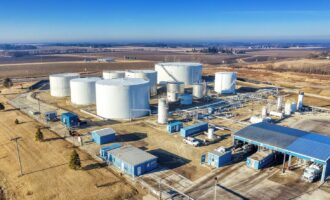Top Tier™ Diesel Standard to Improve Operability and Longevity of Diesel Engines
By Aaron Stone
In early 2017 a brand new TOP TIER™ diesel performance standard was released. The intention of the new standard — to improve diesel fuel quality, address consumer field issues and optimise power and performance of modern diesel engines. The specification was developed by a group of original equipment manufacturers and the program is administered by The Center for Quality Assurance (CQA) based in Midland, Mich., U.S.A.

“Many fuel marketers have realised the benefits of TOP TIER™ Gasoline. The TOP TIER™ Diesel program will similarly raise diesel fuel quality and provide a recognised standard to differentiate from lower quality fuels,” says Brian Lieberman, vice president, Fuel and Lubricant Solutions. BASF recently received approval for its Keropur® DP detergent technology.
OEMs have long been unhappy with a lack of movement in diesel fuel quality within standard setting bodies. Diesel fuel regulations in North America (ASTM D975 and ASTM D7467 for petroleum-diesel and bio-diesel blended fuel) have failed to maintain pace with diesel engine design and equipment changes impelled by emissions regulations and customer demands. Comparisons between the U.S. standards for diesel and biodiesel and the EU standards or Worldwide Fuel Charter have also been unflattering. To provide consumers the assurance of improved diesel fuel quality, a group of OEMs initiated the project for TOP TIER™ Diesel in 2015 with a primary focus on North America. TOP TIER™ is a registered trademark of General Motors, LLC.
TOP TIER™ has a proven track record in establishing performance standards. In 2004 a consortium of global automakers that included General Motors, Toyota, Honda, BMW, Fiat Chrysler, Mercedes Benz, Volkswagen and Audi, working with fuel marketers, launched TOP TIER™ Gasoline. TOP TIER™ Gasoline is a voluntary program designed to address U.S. and Canadian fuel detergency needs without mandatory regulation. Ford joined the list of OEMs involved in 2017.
The diesel program’s requirements focus on quality improvements from additive use and finer dispenser filter media, and control water in fuel by use of a water absorbing filter or active water monitoring system. The program is also administered by the Center for Quality Assurance.

Four main criteria differentiate TOP TIER™ Diesel from the general quality requirements of diesel or biodiesel fuel in the U.S. Measures include a reduction in fuel injector deposits (internal and external) through the inclusion of a detergent additive package; increased lubricity to reduce component failure; a reduction in water and particulate contamination; and finally, improved fuel stability — addressing fuel filter plugging, fuel system deposits and corrosion caused by oxidised fuel. The program is not designed to sort out base diesel or biodiesel fuels; instead the improvements are made by the use of fuel additives and filtration requirements.
The TOP TIER™ program believes the new standard will allow customers to obtain higher quality fuel relative to U.S. standards. Equally important, the organization suggests it allows for a more consistent message to customers from fuel marketers or retailers and vehicle manufacturers.
TOP TIER™ Diesel was developed over 18 months following a preliminary survey of light-duty diesel and heavy-duty diesel manufacturers. The development included a large volume of survey participants, through active participation in the standard definition and development was limited to eight heavy and light duty diesel OEMs. Additive companies, fuel suppliers, marketers and retailers were all actively involved in discussions with OEMs in establishing the standard.

Diesel injector deposits can clog fuel injectors and internal diesel injector deposits (IDID) can cause injectors to stick and even fail completely, thus precluding optimum performance and preventing the engine from achieving the targets for which it was designed. The TOP TIER™ Diesel Program has chosen the globally recognised industry standard Peugeot DW10B (CEC F-98-08) and DW10C (CEC F-110-16) engine tests, which have been specifically designed to measure a fuel’s propensity to form both nozzle coking and IDID respectively.
On July 12, 2017, Afton Chemical Corp. announced they were the first company to receive TOP TIER™ Diesel approval. The company’s North American Diesel Performance Additive (DPA) product line, which contains Greenclean Detergent Technology, successfully achieved the performance level outlined in the new diesel standard.
“We support all fuel quality efforts that seek to improve the operability and longevity of diesel engines,” Afton’s North American Marketing Manager for DPA, Alexandra Fersner, said in a statement.
Innospec Fuel Specialities (IFS), a division of global specialty chemicals business Innospec Inc., quickly followed suit, gaining TOP TIER™ approval for its ECOCLEAN 4200 diesel detergent additive package in August. The ECOCLEAN product line was introduced to the U.S. market in 2006 to address the challenges of ultra- low sulphur diesel fuel combined with modern high-pressure common rail diesel engines. IFS says the product is already used in the treatment of “billions of gallons of diesel fuel each year.”
In September, The Lubrizol Corporation likewise announced that that its diesel deposit control additives have been approved for the TOP TIER™ Diesel Program. “Today’s diesel engines are extremely complex engineered systems and are tasked with meeting demanding targets for power, fuel-economy, emissions and reliability,” says Greg Mathes, Lubrizol Additives’ product manager, downstream fuels. “Fuel quality is critical in ensuring optimum and reliable performance of these engines. Contamination and degraded fuel can cause filters to clog and deposits to form, while fuels with poor lubricity performance can cause excess wear and tear on injectors and fuel pumps.”







